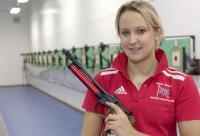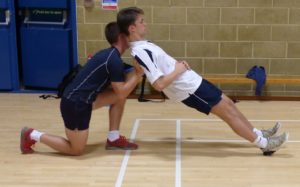Main Menu
Latest Blog Entry
User login
Power Training Research and its Practical Application: Dan Baker, UKSCA conference
Dan Baker has been training the Brisbane Broncos for 15 years, and has had many research articles published. The JSCR isn’t that interesting nowadays, the quality of research is poor, but Baker’s articles are always worth reading- innovative, practical and done with really good athletes- not students.
 This seminar looked at some of that research, and explained how Baker decided on which aspects of strength and power to work on and develop. This was good for me to see how he had come to his conclusions, and I got an insight into his decision making process.
This seminar looked at some of that research, and explained how Baker decided on which aspects of strength and power to work on and develop. This was good for me to see how he had come to his conclusions, and I got an insight into his decision making process.
There was a lot of information in this lecture, but here are some of the key points that I took away:
- Testing and measuring explosive power gives information to the coach that can then be tailored to the athlete, even within a squad environment. A continuum of speed power (0-20% 1RM) ballistic power (20-40%1RM), maximal power (40-60% 1RM), explosive power (60-80%1RM) and max strength (80-100% 1RM) is used.
- Organisation is key in training squads. An example of one session is a 6 minute warm up followed by: bench press 10×10 @60%1RM, incline dumbbell row 10×10 (each db 33% 1RM of bench press) then 10×10 crunches. As a complex, and it starts every 3 minutes. So you can get 10 sets done in 30 minutes. Such high rep activity has an immediate negative effect on power output which is more pronounced in stronger athletes.
- In contrast training, one form is to use 65%1RM @6 reps (after which power declines) followed by a lighter weight explosive action of 30-40% 1RM. Another is to use agonist\ antagonist complex training which helps increase power output. For example using pulls or cleans followed by jerks or bench throws.
- To create a within repetition difference, chains are useful, try 10-20% of the total load, this works well for experienced athletes. Baker uses a chain bench press, followed by bench throws complex with 75 seconds rest between exercises.
-
Baker doesn’t chuck people in at the deep end- there is a progression within the Broncos, getting the athletes young and early. From 13-15 years they develop the body structures with various exercises. Then from 15-17 they introduce barbell exercises at 6-15 reps, and then from 17-18 look at heavier strength training. Most of the changes occur in the first 4 years of the heavy strength training, after that the fatigue induced by playing means it is a case of not getting weaker.
- Baker trains hypertrophy just short of fatigue (a common theme of this conference) so a couple of reps short of failure for the first 2 sets, followed by a 3rd set hard. He includes some isometric strengthening exercises around sticking points within the sessions.
Someone asked a question at the end – “If you had one thing that came up as a result of your training and experience what would it be?”
Dan Baker replied “hard work”. Funny how it comes back to that a lot of the time.
This lecture was informative and entertaining, I recommend you read Baker’s research, but more importantly have some kind of thought process and structure to your training philosophy. This was probably the only lecture in the whole conference given by a true Coach (that I saw anyway) and more emphasis on Coaching should be given.
I had a quick chat with Dan after the lecture, and he was good enough to talk about some other ideas and experiences including wrestling\ grappling and conditioning drills.
See our Get Stronger programme
Client Testimonials
 Louise Helyer – Modern Pentathlete, Commonwealth Games Silver Medallist Epee
Louise Helyer – Modern Pentathlete, Commonwealth Games Silver Medallist Epee
I have been working with James since September 2009, with a history of becoming injured in winter months our main goal was to over come this and help my core/hip area to become more stable thus enabling me to run at my full potential. Not only have I made it through the winter months without gaining the usual knee injuries I have also improved my performance to currently become one of the top ranked athletes.
More



Comments
[…] there were a couple of key exceptions: Dan Baker and Nick Allen. There seems to be an element of confirmation bias within the UKSCA and they do hire […]
[…] 24/7 concept. Sometimes the recovery and other factors need to be taken into account, and as would Dan Baker say no amount of good planning and monitoring could replace good old professional habits of the […]